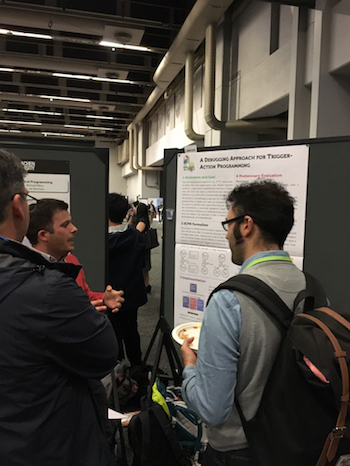During the ACM Conference on Human Factors in Computing Systems (CHI), held in Montréal, Canada, from the 21th to the 26th of April, Alberto Monge Roffarello presented his work on end user debugging for the Internet of Things. The presentation took place during two different poster sessions, and saw a discrete partecipation and some interesting discussions, both with people in the industry and in academia.
The paper associated to that presentation is entitled A Debugging Approach for Trigger-Action Programming, authored by Luigi De Russis and Alberto Monge Roffarello. It introduces a novel end users debugging approach for trigger-action rules (i.e., if something happens, then do something else") in the IoT.
The goal of the work, in fact, is to assists end users during the composition of trigger-action rules by highlighting possible problems that the rules may generate, and allowing their step-by-step simulation, if needed. The approach presented in the paper is based on Semantic Web ontologies and Petri Nets, and it has been implemented in a software tool as well as preliminary evaluated in a user study. Results suggest that the approach successfully helps users in understanding and identifying problems in trigger-action rules.
More information:
- Paper in the IRIS@PORTO repository (freely accessible)
- Paper in the ACM DL
- DOI: 10.1145/3170427.3188641
- Poster presented at CHI (PDF)


